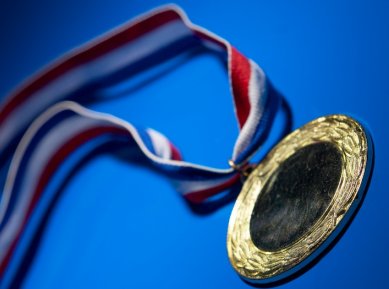The Gottfried Wilhelm Leibniz Prize is the highest honor awarded in German research. Eleven outstanding researchers were chosen by the German Research Foundation (DFG; Deutsche Forschungsgemeinschaft) from 129 nominees. Nine of the winners received 2.5 million euros each and two winners received 1.25 million euros, sharing one prize. The prize money can be used by the winners to support their research for a period of up to seven years. It is aimed to give the researchers the freedom to carry out their research without the need to overcome bureaucratic hurdles.
The 2014 Gottfried Wilhelm Leibniz Prize was presented at an award ceremony on 12 March 2014 at Berlin-Brandenburg Academy of Sciences and Humanities, Germany, to the following scientists and academics for significant achievements in their field of research:
- Professor Artemis Alexiadou, Linguistics, University of Stuttgart, is honored for her work on modern grammatical theory especially for the development of models for linguistic structures.
- Professor Armin von Bogdandy, Public Law and International Law, Max Planck Institute for Comparative Public Law and International Law, Heidelberg, has made a name for himself in the area of constitutional, European and public international law.
- Professor Andreas Dreizler, Combustion Research, Technical University of Darmstadt, and Professor Christof Schulz, Combustion and Gas Dynamics, University of Duisburg-Essen, share an award in recognition of their work on quantitative laser diagnostics of reactive flows. This work includes research that they performed independent of each other, as well as some collaborations between the two scientists.
- Professor Nicole Dubilier, Marine Ecology, Max Planck Institute for Marine Microbiology Bremen and University of Bremen, is honored for her research on symbosis, in particular the investigation of ecological and evolutionary adaptations between bacteria and marine invertebrates.
- Professor Leif Kobbelt, Computer Science/Computer Graphics, RWTH Aachen University, works in the field of geometry processing and is recognized for his work on algorithms and data structures to enable the realistic representation of three-dimensional models.
- Professor Laurens Molenkamp, Experimental Solid-State Physics, University of Würzburg, is recognized for his involvement in establishing topological insulators as a new field of research.
- Professor Brigitte Röder, Biological Psychology/Neuropsychology, University of Hamburg, works on the interfaces between cognitive psychology, developmental psychology and cognitive neuroscience, investigating the basic mechanisms of neuroplasticity.
- Professor Irmgard Sinning, Structural Biology, University of Heidelberg, is honored for research into protein complexes that transport different membrane proteins to the correct cellular compartments in the appropriate target membranes.
- Professor Rainer Waser, Nanoelectronics/Materials Science, RWTH Aachen and Peter Grünberg Institute at Research Centre Jülich GmbH, is recognized for his research into a broad range of areas including pure solid-state chemistry and defect chemistry, electronic properties and modelling, the technology of new materials, and the physical properties of construction components.
- Professor Lars Zender, Hepatology/Oncology, University Hospital Tübingen, focuses on the liver and he has decoded fundamental new mechanisms that enable liver function to be maintained or restored.
Selected publications by the award recipients:
- The syntax of clitics revisited: two types of clitics,
Mihaela Marchis, Artemis Alexiadou,
Lingua 2013, 127, 1–13.
DOI: 10.1016/j.lingua.2013.01.002 - The Lex Mercatoria of Systems Theory: Localisation, Reconstruction and Criticism from a Public Law Perspective,
Armin von Bogdandy, Sergio Dellavalle,
Transnational Legal Theory 2013, 4, 59–82.
DOI: 10.5235/20414005.4.1.59 - High-speed PIV and LIF imaging of temperature stratification in an internal combustion engine,
Brian Peterson, Elias Baum, Benjamin Böhm, Volker Sick, Andreas Dreizler,
Proc. Combust. Inst. 2013, 34, 3653–3660.
DOI: 10.1016/j.proci.2012.05.051 - Experimental investigation and modeling of the kinetics of CCl4 pyrolysis behind reflected shock waves using high-repetition-rate time-of-flight mass spectrometry,
M. Aghsaee, A. Drakon, A. Eremin, S. H. Dürrstein, H. Böhm, H. Somnitz, M. Fikri, C. Schulz,
Phys. Chem. Chem. Phys. 2013,15, 2821–2828.
DOI: 10.1039/c2cp42574b - Animals in a bacterial world, a new imperative for the life sciences,
Margaret McFall-Ngai, Michael G. Hadfield, Thomas C. G. Bosch, Hannah V. Carey, Tomislav Domazet-Lošo, Angela E. Douglas, Nicole Dubilier, Gerard Eberl, Tadashi Fukami, Scott F. Gilbert, Ute Hentschel, Nicole King, Staffan Kjelleberg, Andrew H. Knoll, Natacha Kremer, Sarkis K. Mazmanian, Jessica L. Metcalf, Kenneth Nealson, Naomi E. Pierce, John F. Rawls, Ann Reid, Edward G. Ruby, Mary Rumpho, Jon G. Sanders, Diethard Tautz, Jennifer J. Wernegreen,
Proc. Natl. Acad. Sci. U. S. A. 2013, 110, 3229–3236.
DOI: 10.1073/pnas.1218525110 - View-Dependent Realtime Rendering of Procedural Facades with High Geometric Detail,
Lars Krecklau, Janis Born, Leif Kobbelt,
Computer Graphics Forum 2013, 32, 479–488,
DOI: 10.1111/cgf.12068 - Imaging currents in HgTe quantum wells in the quantum spin Hall regime,
Katja C. Nowack, Eric M. Spanton, Matthias Baenninger, Markus König, John R. Kirtley, Beena Kalisky, C. Ames, Philipp Leubner, Christoph Brüne, Hartmut Buhmann, Laurens W. Molenkamp, David Goldhaber-Gordon, Kathryn A. Moler,
Nat. Mater. 2013 12, 787–791.
DOI: 10.1038/nmat3682 - Sensitive periods for the functional specialization of the neural system for human face processing,
Brigitte Röder, Pia Ley, Bhamy H. Shenoy, Ramesh Kekunnaya, Davide Bottari,
Proc. Natl. Acad. Sci. U. S. A. 2013, 110, 16760–16765.
DOI: 10.1073/pnas.1309963110 - Longin and GAF Domains: Structural Evolution and Adaptation to the Subcellular Trafficking Machinery,
Nicola De Franceschi, Klemens Wild, Alexander Schlacht, Joel B. Dacks, Irmgard Sinning, Francesco Filippini,
Traffic 2014, 15, 104–121,
DOI: 10.1111/tra.12124 - Generic Relevance of Counter Charges for Cation-Based Nanoscale Resistive Switching Memories,
Stefan Tappertzhofen, Ilia Valov, Tohru Tsuruoka, Tsuyoshi Hasegawa, Rainer Waser, Masakazu Aono,
ACS Nano 2013, 7, 6396–6402,
DOI: 10.1021/nn4026614 - A Direct In Vivo RNAi Screen Identifies MKK4 as a Key Regulator of Liver Regeneration,
Torsten Wuestefeld, Marina Pesic, Ramona Rudalska, Daniel Dauch, Thomas Longerich, Tae-Won Kang, Tetyana Yevsa, Florian Heinzmann, Lisa Hoenicke, Anja Hohmeyer, Anna Potapova, Ina Rittelmeier, Michael Jarek, Robert Geffers, Maren Scharfe, Frank Klawonn, Peter Schirmacher, Nisar P. Malek, Michael Ott, Alfred Nordheim, Arndt Vogel, Michael P. Manns, Lars Zender,
Cell 2014, 153, 389–401.
DOI: 10.1016/j.cell.2013.03.026




